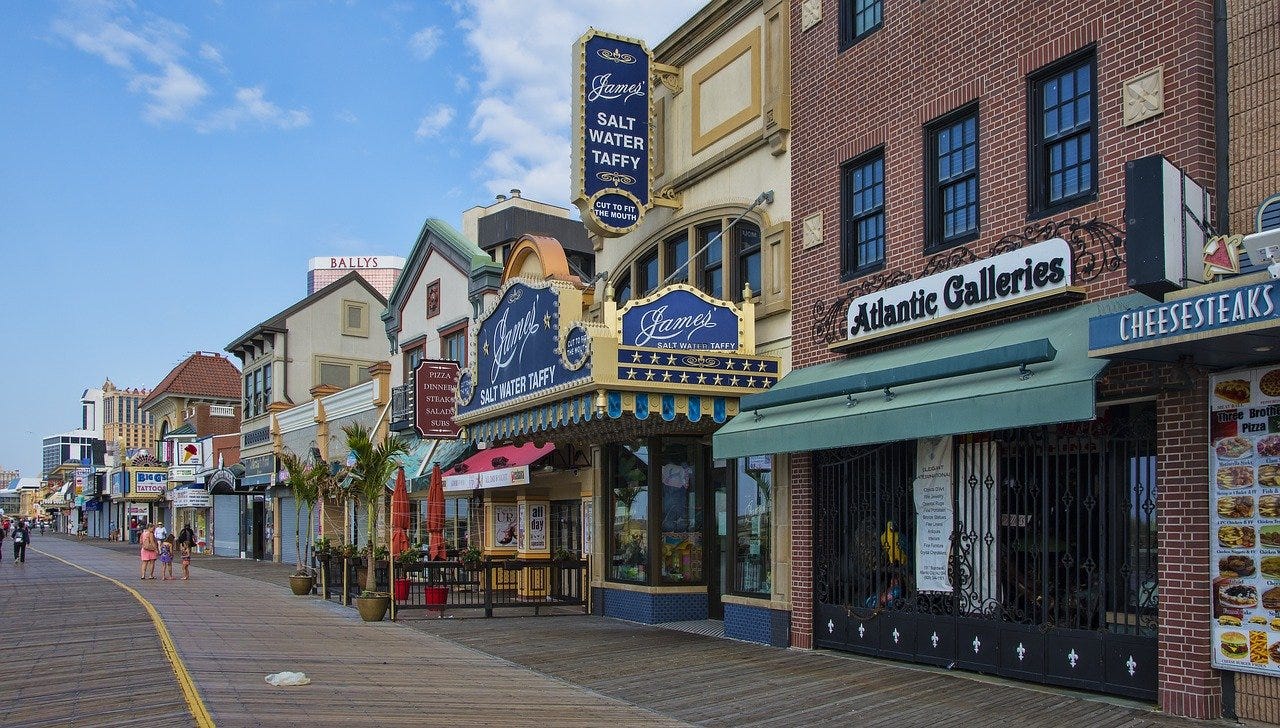Econ Weekly (Aug. 23, 2021)
Featured Place: Atlantic City, New Jersey
Reminder: Econ Weekly publishes 48 issues per year. We will return with our next issue on Sept. 13.
Inside this Issue:
A Fall Stall? Fears of a Hindered Recovery as Virus Variant Vexes
Energy Use Reduced: Oil Ails Amid Covid Travails
Supply Chain Curse Gets Worse: Covid Curbing Asian Output
The Retail Whale: Walmart Still Firing on All Cylinders
The Retail Fail: Kmart Somehow Still Alive
Home Repo: And Foreign Repo too as Fed Fights Dollar Risk
Cambridge Binge: Biotech Booming as Moderna Inspires
Satellite Fight: More Competition in the Space Economy
The Bill from Kabul: How Much Did the U.S. Spend in Afghanistan?
Remembering a Fiscal Fiasco: The Savings and Loan Crisis of the 1980s
And This Week’s Featured Place: Atlantic City, New Jersey, Unviable Visions of Vegas
Quote of the Week
“We like the assets we’ve got. I think some people view stores these days as boring. We don’t.”
-Walmart CEO Doug McMillon
Market QuickLook
The Latest
Oil prices plunged last week. What does it mean?
It’s a sure sign that the world is becoming more pessimistic about the global economy’s recovery. Demand for oil and other commodities is softening as Covid stubbornly persists in tormenting humanity. In the U.S., hospitals are again filling up. Companies are reversing earlier plans for an autumn return to the office. Airlines are seeing their bookings start to soften. In East Asia, meanwhile, where vaccination efforts are slower and less effective, countries are finding their ultra-strict quarantines to be less effective against Covid’s new and more dangerous Delta variant. And that matters to the U.S. economy, whose supply chains include Asian factories and seaports that are now seeing virus-related disruptions.
America’s supply shock, indeed, is getting worse, perhaps making inflation more persistent. At the same time, demand—while still strong according to most U.S. companies—stands to soften some as fiscal and monetary support dissipates. The Fed, for its part, seems ready to stop its stimulative asset buying. Leaders could say more about that at a symposium this week, an event by the way just switched to virtual rather than in-person. Damn Covid just won’t go away.
Walmart is the most important company to reassure about demand strength. Other retailers generally agreed, offsetting some concerns raised by a Census report showing a decline in retail sales. Some of that decline, to be clear, was driven by drivers—fewer of them, in other words, buying autos. The auto issue of course, is specifically tied to a shortage of semiconductors not helped by Asia’s new struggles with Covid. Vietnam, for example, is a major production site for top semicon firms like Intel and Korea’s Samsung.
Back in the U.S., the new school year is now underway throughout much of the country. Labor economists hope more parents will be able to reenter the workforce, addressing what’s still an uncomfortably low rate of workforce participation. Nevada by the way, still has the nation’s highest unemployment rate, reflecting the troubles of Las Vegas and its tourist industry. Nebraska and Utah have the lowest rates. The next nationwide jobs report (for August) will come Sept. 3. But hopes are higher for subsequent reports that better capture school reopenings across the country. Then again, if Covid problems continue to worsen, the recent run of job market momentum could stall, not strengthen.
The housing market isn’t strengthening. But then again, how could it? It’s already on fire. But the flames are waning as homebuyers balk at high prices. On Capitol Hill, Democrats are maneuvering among themselves to pass a double infrastructure/care economy agenda. It’s a chief topic of coverage for The Hill, a political news provider that broadcast media giant Nextstar said it will buy for $130m—Nexstar is trying to build a news empire that’s less partisan than existing alternatives. Amazon, the Wall Street Journal reports, wants to open more brick-and-mortar retail stores. Tesla wants to build human-like robots and a world in which “physical work will be a choice.” Landlords are grappling with the difficulties of repeated rent forbearance (but not forgiveness). And Q2 earnings season is winding down, though not before a week featuring reports from Best Buy, Dell, Dollar General, Peloton and so on.
Read on for a trip to Atlantic City, a gambling mecca that never quite managed to replicate the success of Las Vegas. Like other subjects of Econ Weekly place profiles, Atlantic City has specific challenges that aren’t often captured in discussions about the broader national economy. Speaking of which, the national economy—as Bloomberg’s Allison Schrager points out in a must-read article—has a future that will likely look more like The Villages in Florida than superstar cities like New York or San Francisco. The Orlando-area retirement community remains the fastest-growing place in America, with an “economy that’s older, less dynamic and more reliant on government benefits.”
Another can’t miss article—by Kevin Williams of the New York Times—tells the story of Kmart’s demise, which coincided with Walmart’s rise. More on that below. And lots of other interesting stuff as well!
To read the remainder of this issue, visit www.econweekly.biz
Alos be sure to sign up for our free newsletter about the North American railroad industry at: railroadweekly.substack.com



